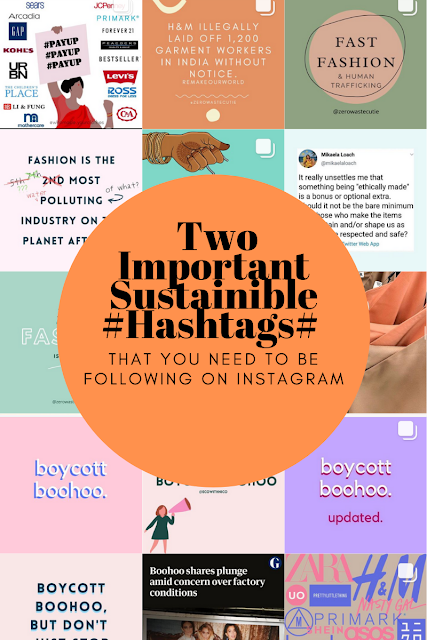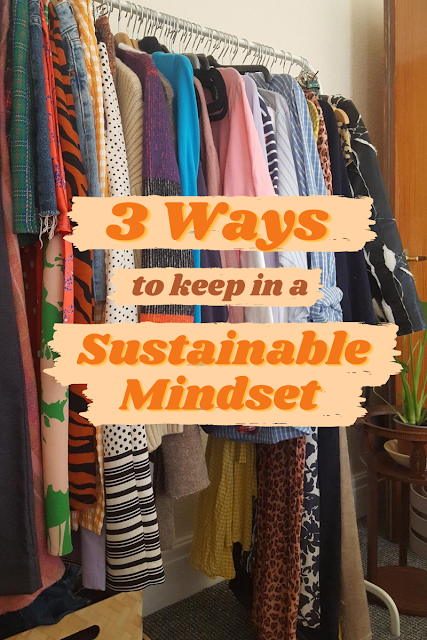"Welcome back! We've missed you."
*As this post went live, updates of lockdown restrictions tightening again have been coming in thick and fast. While discussing sustainability is crucial, please prioritise keeping safe and protecting others by wearing a mask where-ever possible!*
Since mid-June, lockdown restrictions have shifted dramatically, allowing many of our favourite high-street stores to re-open. It's been the first sign of things returning to normal; our much-missed routines becoming more tangible as we edge back into a sense of normality. But what does this actually mean? And how does such an innocent desire come as such a huge risk for the sustainability movement in the fashion industry?
Let's start with the obvious - fast-fashion relies on speed. These brands target trend-conscious people who live busy lives, and don't have time to think about the production cycle of their clothes. So in the wake of a pandemic that forces our normal lives to be on-hold, you can understand how these brands should become less popular. Of course, the issue is that fast-fashion brands still hold such sway in the market and were never going to disappear overnight, but we are starting to see some steps in the right direction. Even though #StayAtHomeStyle certainly gained traction as an e-commerce movement during the peak of lockdown, we've inevitably witnessed a global decline of consumer enthusiasm over the past few months.
While no-one could have predicted Covid-19, it seems as though the fashion industry was already preparing for turbulent times. The State of Fashion - a report published by Business of Fashion and McKinsey & Company in November 2019 - expressed the 'prevailing mood of anxiety and concern' that was looming over the global fashion industry in 2020. The guidance given in this document highlighted sustainability as a key component for success this year, and urged industry participants to 'swap platitudes and promotional noise for meaningful action and regulatory compliance while facing up to consumer demand for transformational change.'
Fast-forward to the present day, and the statement could not be more accurate. With more time to educate ourselves on the environmental impact of fashion, the consumer has now developed a more sophisticated distaste towards 'waste-producing business models' and has 'heightened expectations for purpose-driven sustainable action.' Case in point - #BoycottBoohoo made the 'rounds on social media in July, after news broke about modern slavery being evident in their supply chain (they've been paying their factory workers in Leicester as little as £3.50 an hour). Case in point number two - #PayUp was created to call out fast-fashion brands that are refusing to pay their factory workers for stock that has been disrupted due to the pandemic - Topshop alone has been reported to cancel 9 million pounds worth of orders in Bangladesh, putting their employees in dangerous financial situations that could push them into poverty.
It's definitely a step in the right direction, but the issue we now face is how do we keep up the momentum as the world reverts back to normal? In reality, fashion is chomping at the bit to get back to work, and we as the consumer have been starved of new things to obsess over. In terms of sustainability, it's a potential recipe for disaster. Old habits die hard, and in this case, they die covered in a heap of cheap polyester and one-wear garments. While the consumer hasn't been forced to go cold-turkey on fashion - thanks to online shopping - desires have been well and truly repressed... and in terms of fashion post-lockdown, boy do we have a surge coming.
As we start venturing out onto the high street again, we're also becoming more susceptible to old ideologies that allow mindless purchases and encourages irresponsible fashion choices. Erin O'Brien, founder of @fairfashionproject, recently commented on the alarming influx of YouTube videos promoting post-lockdown Primark hauls, aligning with the re-opening of shops in Britain. As I did some digging around the topic, I soon realised that after clicking consecutively on different haul videos, they all branded the same tone...
"I'm hyperventilating a little bit... I'm so excited" said one.
"I mean, I'm not gonna lie guys, this is making me a little bit emotional right now," said another.
"Oh my god, I think I'm about to film the most exciting video," said... yet another.
You get the idea. There's mass hysteria around the prospect of being able to shop in our favourite stores again. Crowds of people were reported to be gathering outside Primark's up and down the country at as early as 5am on the day of re-opening. One video circulated online that captured a stampede of people pilling into a JD Sports as soon as the shutters went up. We're craving stuff at any cost, regardless of a store's ethical values, that conveniently gets swept under the rug. This also ties into the idea of brand affinity - a term used to describe consumers who believe their values align with a particular brand. Beliefs like this can be dangerous though, as research shows that brand affinity can also come with a 'halo effect' - Vogue Businesses' Rachel Cernansky noted that "how much someone likes a brand positively correlates with how sustainable they believe the brand to be, no matter how sustainable the brand actually is". And sure enough, we're seeing this kid-in-a-candy-store consumerism mentality start to creep back in, supported by Content Creators who brandish 'HUGE' 'NEW IN' 'POST-LOCK DOWN' hauls, where bulk buying is actively encouraged.
So where does that leave us? Ultimately, we're in a time where over-consumption due to exposure could land us right back at the beginning of our sustainability journeys. I'll hold my hands up now and admit I deviated from my strict list of essentials on my first trip back into the city centre, ending up in Monki clutching a sale dress that I considered buying. It's scary shit man. To conclude then, let's learn from my mistakes and list three main things we can do to keep on the straight and narrow.
1. Keep doing your research
- Education is key. The more you learn about fast-fashion, the more repulsed you'll be. Keep on saving those informative Instagram posts, follow hashtags, and try and get your hands on some educational books. I also highly recommend the Good On You app and website - they'll tell you the eco-score of any fashion brand at the click of a button, while also recommending some great alternatives.
2. Limit Your Exposure
- This applies to on-the-ground, high-street, mooching-about shopping. Think of it like rays of sun; full, unprotected exposure ultimately means more harm... so what do you do? You avoid it, or you limit and protect yourself to how much you take in. In this instance, if you feel as though avoidance is too much, pick a maximum of two stores that you want to go in, and stick to it (this is as much a mental note to myself as it is advice for you, dear reader).
3. Deploy the 'What Why How' strategy
A step-by-step guide that makes you really think before you buy;
- What is the purpose of this purchase?
- What would you wear it with?
- What would happen if you put it back and walked away?
- Why do you want it?
- Why this brand?
- Why now?
- How do you intend to pay for it?
- How long do you think the garment will last?
- How wearable is it?
Wishing safe and sound energy to all x






This echoes so much of what I have been thinking and feeling, its alarming the few times I have walked through town at just how much *stuff* people are buying, as though they have been starved. I really hated how big brands utilised corona as a marketing opportunity, and the number of people I heard who had had deliveries every single day made me sick - I honestly forgot people shopped like that??? I love the list of questions too, so often you get swept up in the purchasing! xx
ReplyDeleteIt's a harsh reality of the consumerist world we live in isn't it. I've seen so many influencers / people online showing off their daily deliveries and now showing off their high-street hauls and you can't help but think that half of the *stuff* is going to be thrown out / sold on in a matter of months! xx
DeleteThank you so much for this insightful post. It's something that's been on my mind for a while now and this has just pointed me in the right direction. Great writing as always Emmie :D x
ReplyDeleteThank you so much Georgia - I'm glad you enjoyed reading it! xx
Delete